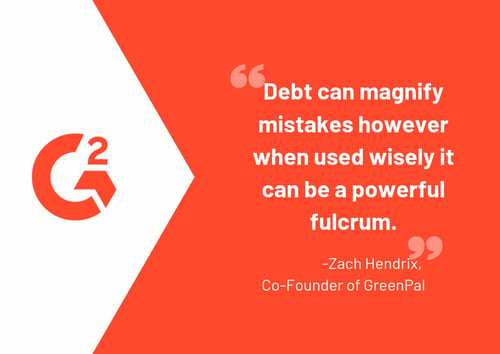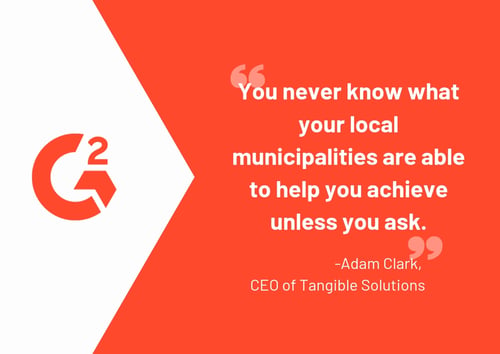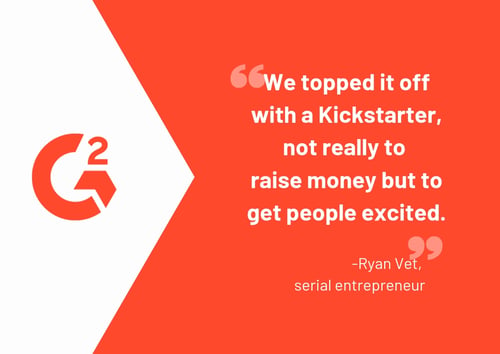

What do small business entrepreneurs do in between the lightbulb moment and launch day?
It obviously varies greatly by industry, but there is one universal challenge each small business owner must face: funding.
Large corporations’ capital structures hold such weight in our global economy that they are covered in the news, but the stories of small business owners are often overlooked. Finding funding can be difficult for small business owners, even with countless options available. Business loans and other bank lending agreements, notes payable from family or friends, angel investors, and crowdfunding are common finance strategies, but how can you know which one is right for you?
It helps to hear from peers about which strategy they used. We asked a few small business owners to share their startup stories. Take a tip from them—they successfully funded their ideas in one way or another, and can now reap the benefits.
Loans seem like the obvious choice for funding small businesses, but the amount of available options can be overwhelming. Find a combination that works for you and use loan software to make sure you stay organized.
“I used a combination of bank loan, SBA loan and a ROBS (rollover as a business startup) to fund my business. With a ROBS, simplistically, one creates a profit-sharing plan into which a 401k or IRA is rolled over. This profit sharing plan then purchases the assets or stock of the business as one of its investments. Since a lack of personal liquidity for the down payment was my biggest hurdle, the ROBS was the only option. It has turned out well. We are in our 10th year in business.”
-Jeff Rasumssen, President at Fairway Auto Care Center, Fairway Business Advisors
Sometimes the path you take to fund your small business chooses itself! If investors turn you down, make a plan to raise debt capital, and pay it off. You can do it.

“Debt can magnify mistakes. However, when used wisely, it can be a powerful fulcrum. Our vision was just too broad in scope and luckily we got turned down (by angel investors and venture capitalists) over 40 times. I was fortunate enough to have solid personal credit, and this enabled my team to secure an unsecured line of credit for $85,000 to get our business started. We dipped into the entire credit limit through three cash advances we got off of my personal credit card to get us through the first year. We paid that off in the second year and this year we're going to surpass $3 million in annual revenue. Good thing early investors told us no, because with their capital they would have owned and controlled 30% of our business, and because we are self funded my co-founders and I own it all.”
-Zach Hendrix, Co-Founder of GreenPal
Look into municipal loans; you might be surprised what your local municipality can do for you. These are especially useful if you plan on your business becoming a fixture within the local community in your town or city.

“For the first three to four years of our business, we were self funded. When the time came, we pursued traditional bank financing with the Small Business Administration coupled with some equity partners...We were also able to receive a loan from the municipality in which our business now resides...thanks to the loan. The city was actually the easiest entity to work with. You never know what your local municipalities are able to help you achieve unless you ask.”
-Adam Clark, CEO of Tangible Solutions
Equity financing is useful for high-growth startups, but it’s not for everyone.
Some would rather go for a business line of credit or other kind of debt financing because they want to avoid diluting ownership. If you’re debating between angel investors who will require some equity in exchange for their support or debt capital that might haunt you (and your credit score) forever, think about your growth plans.
Are you a tech startup looking to grow quickly? Seeking out investors might be a good idea. Are you a small business looking to thrive but not grow as much? You might be better off keeping your equity and looking into debt financing.
“The average small business is better off with debt because you can get capital while retaining 100% ownership of your company. If you decide on equity, the approach is to find investors who are familiar with your industry and make a pitch that's receptive to them. If you decide on debt, the best option for you will depend on your credit profile, the length of time you've been in business, and your business's annual revenue (if any). Bank loans are available for those with the best credit profiles and profitability, and online alternative lenders lend to those with lower credit scores and lower revenue.”
-Priyanka Prakash, Lending and Credit Expert at Fundera
| Explore Fundera's software to find finance options for your small business—you can also leave a review. |
 5. Finance with debt now, equity later
5. Finance with debt now, equity laterSometimes it’s easier to play it safe with a little bit of debt funding and tapping into savings. You can always revisit the idea of angel investors later on once your business is more established and can more easily attract them.
“Card Isle has raised over $1.1 million from angel and institutional investors. But it didn’t happen all at once. We took a “crawl, walk, run, fly” strategy. The first couple thousand came from the founders, then we raised some from friends and family. After that, we got into a Techstars accelerator, which gave us access to all sorts of investors across the country. And our continued growth has supported continued investment.”
-Adam Donato, CEO and co-founder at Card Isle
Get started funding your small business with the help of family and friends using our promissory note template.
Traditional financing doesn’t always work out, but crowdfunding might. Platforms like Kickstarter and GoFundMe help source funding regular people (not investors) who want to help your business with small amounts of money. Their contributions add up to a large sum of money, and the social media surrounding crowdfunding campaigns can give your business some extra publicity at the same time.
“I had a near 800 credit score and 250k in securable assets, but it was not enough for anyone from the local credit union to the national banks. After cashing in the retirement accounts, taking a second mortgage, and opening a personal LOC I still needed some funding. That is when turned to KickStarter.”
-Nate Blury, CEO at Original Tin Cup Co.

“For our second business, we opened a coffee shop and wine bar. We did personal loans from friends and family. We topped it off with a Kickstarter, not really to raise money but to get people excited. We raised about 10% more than our goal.”
-Ryan Vet, serial entrepreneur
You might need to take a risk and leverage an asset you are unsure about. If you go with your gut and carefully execute a marketing and business plan, you’ll be profiting before you know it.
“My first business was funded with my wife-to-be's engagement ring fund and the sweat equity of my business partner. Thankfully, after the first trade show, we doubled the money and I was able to buy my wife a great ring.”
-Ryan Vet, serial entrepreneur
|
TIP: Identify where you can cut costs and start saving today. Activate your free G2 Track account and see if you're adding to the $40 billion spent on unused software every year. |
Shooting in the dark can only take your small business so far, and impulsive decisions can backfire in the long run. When funding your small business, explore your options as best you can, and make a calculated plan to pay off your debts or sacrifice some equity for success.
Are you already an expert? Consider joining our network of contributors who reach over one million visitors monthly on G2's Learning Hub. Sign up for our content partnerships program.
Maddie is a former content specialist at G2. She also has a passion for music and cats. (she/her/hers)
All small businesses and startups began with a great idea. For many, the next step was to...
 by Maddie Rehayem
by Maddie Rehayem
Do you ever look back on a mistake you made when you were young and think, “Wow, I wish I knew...
 by Mary Clare Novak
by Mary Clare Novak
When people hear the phrase small business, they might picture an underdog.
 by Mary Clare Novak
by Mary Clare Novak
All small businesses and startups began with a great idea. For many, the next step was to...
 by Maddie Rehayem
by Maddie Rehayem
Do you ever look back on a mistake you made when you were young and think, “Wow, I wish I knew...
 by Mary Clare Novak
by Mary Clare Novak
Never miss a post.
Subscribe to keep your fingers on the tech pulse.


